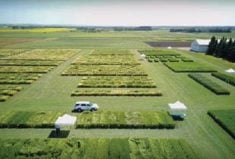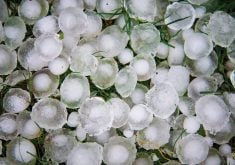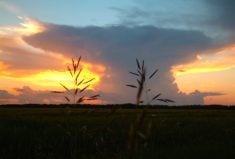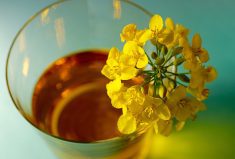While it wasn’t the success hoped for, researchers have proven that rice can be grown under irrigation in southern Alberta.
The plants failed to reach harvest, but project lead Michelle Konschuh said they did surprisingly well for a crop rarely grown in Canada.
“We didn’t quite get to the finish line,” said the irrigated crop scientist with the University of Lethbridge. “We did get panicles (the top part of a rice plant) to form and we got seed to form on the panicles but we didn’t get seed to mature. You can’t harvest unless you have mature seed.”
Read Also

Innovation takes centre stage at record-breaking Ag Expo
Lethbridge event hits capacity with 326 global exhibitors showcasing the latest ag tech, innovation and the 129th North American Seed Fair.
The project offered some takeaways.
For example, finding varieties better suited to southern Alberta’s climate is key.
“We would need to do a better job of selecting varieties suited for this climate, not just because of the short growing season but also because we have long days in the summer here and a lot of rice is ready to flower when the days start to get shorter,” said Konschuh.
“If they don’t flower until the days get shorter, we run out of season. We need varieties that are going to flower regardless of day length, such as shorter season varieties and varieties that are what we call photo period insensitive.”
That could be a tall order but not an insurmountable one.
“There are rice varieties in mountainous regions in the Himalayas and places in China that might be more suited to our climate,” she said. “Our climate is not dissimilar to parts of China and rice from those regions may work well here.
“There are many different types of rice and the International Rice Research Institute catalogues a lot of the varieties and the breeding. So I think it’s a matter of finding a good fit in terms of the germplasm.”
[RELATED] Sounds like a long shot but rice could actually be a fit for Alberta
The research was commissioned and funded by Galaxy Ag Ventures, a Calgary company that invests in R&D for special crops. Land, equipment and technical support was provided by Farming Smarter, and a University of Lethbridge undergraduate student was hired to work on the project.
Two rice varieties, one Korean and the other from the U.S., were planted using three different methods: seed film, transplanting from a greenhouse and direct seeding. The latter two proved to be the most successful practices.
“The best ones were transplanted partly because the plants were a little older when they came out. But certainly direct seeding could work fine. We would need to plant early enough in the season to get a head start but not so early that we risk frost, because rice doesn’t do well with frost.”
Seed film, a plastic that maximizes moisture, suppresses weeds and provides a thermal insulator, only did “OK.”
“They germinated and came up through the cracks or spaces they were intended to but our difficulty was getting sufficient moisture through the plastic to keep the plants hydrated,” said Konschuh.
“Although (the film) did suppress weeds, they still found their way to the openings and grew up right beside the rice, so we had some weeding challenges.”
[RELATED] Farmtario: Ontario trials of cold-tolerant white rice could prove alternative crop potential
Rice requires a lot of water, about as much as thirsty crops such as corn, potatoes and sugar beets.
“We found this year that with irrigation, we can provide sufficient moisture for a rice crop to grow. We tried a subsurface drip irrigation site as well as an overhead irrigation site. Of the two, the overhead irrigation did better but that probably had a lot to do with timing. We potentially could do well with subsurface but we would have to explore that a lot more.”
The two varieties did not respond the same way, but that was a good sign, said Konschuh.
“It was nice to know there is a varietal difference. We can exploit that by looking at different varieties and trying to do some selection for our conditions.”
Hand weeding became the default management practice simply because researchers didn’t know what herbicides could be used.
“The PMRA (Pest Management Regulatory Agency) doesn’t register chemicals for crops we don’t grow yet.” said Konschuh. “It might be possible for us to get a user-requested minor use label expansion if we decide to grow rice as a crop. There’s some possibilities.
“If we did a wider planting, we could potentially use an inter-row weeder in the early part of the season until the rice can compete.”
Further research will depend on Galaxy Ag’s willingness to continue. The strategic investment company and agri-food developer is interested in rice-based non-gluten products, which are in high demand.
““It’s something that we don’t have a crop commission for and we are fairly limited for funding for new crops in Alberta,” she said. “So in this case it would be very much dependent on the sponsor.”
















